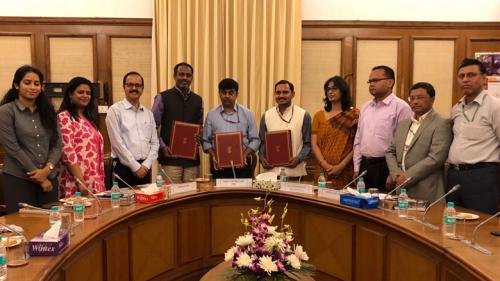Government of India and World Bank Sign New Project to Revitalize Natural Resources in Meghalaya
The Government of India, the Government of Meghalaya and the World Bank, on April 16th, signed a $48 million loan agreement to support select communities in Meghalaya manage their natural resources using a community-led landscape approach.

The Project will directly benefit at least one lakh rural people, half of whom are women. In addition, some 30,000 youth will gain from training, capacity-building and access to knowledge, innovation, and technology.
The agreement for the Project was signed by Sameer Kumar Khare, Joint Secretary, Department of Economic Affairs, Ministry of Finance, on behalf of the Government of India; P. Sampath Kumar Resident commissioner & CEO, Meghalaya Basin Development Authority on behalf of the Government of Meghalaya; and Hisham Abdo, Acting Country Director, World Bank India, on behalf of the World Bank
The Government of India is committed to the economic development of the North East and supports the measures adopted by the states to reduce risks posed because of climate change,” said Sameer Kumar Khare, Joint Secretary, Department of Economic Affairs, Ministry of Finance. “Meghalaya’s natural resources such as land, water sources and forests is a source of livelihood for a majority of the population in the state. The Project will help manage these depleting resources, by strengthening communities and traditional institutions. Restoration of degraded and highly degraded landscapes under the Project will increase water for local communities and improve the soil productivity which will in turn increase incomes and reduce poverty.”
The Meghalaya Community-Led Landscapes Management Project will support the state’s unique community-based natural resource management (NRM) system, which relies primarily on its population – the Khasi, the Garo, and the Jaintia tribes – to manage its forests and natural resources through customary laws. The forests are designated as ‘unclassified forests’ in the state records and for the most part do not receive technical or financial support from state institutions. Further, there are no water-related institutions or legal frameworks for water management in the state. Waterbodies, rivers, and springs are considered common property like forests and are managed by traditional tribal institutions.
“The Government of Meghalaya recognizes the importance of supporting community-led interventions to restore and sustainably manage forests, land and water resources, as well as Meghalaya’s rich biodiversity, on which 80 percent of the population depend,” said Hisham Abdo, Acting World Bank Country Director in India. “Various interventions in soil and water management under the Project will improve the availability and reliability of water sources for drinking, empower communities to make the best use of their natural resources and accelerate economic growth and well-being of every community in Meghalaya,” he added.
The project will prioritize around 400 villages located in ‘very critical’ and ‘critical’ (degraded) landscapes, over a period of five years, for their treatment. Landscape planning and investments will be preceded by extensive training for communities and project management staff at the field level. The project will extend such training to communities beyond the targeted villages to help expand the reach of the project to a wider cohort of villages.
At the state-level, all communities will benefit from training and development; additionally, small grants will be given to kick-start innovation around natural resource management. Traditional knowledge related to natural resource management will also be captured and fostered as a part of this process. A special emphasis will be on creating climate resilient livelihood opportunities for communities, particularly youth and women.
“While joint forest management has been the dominant model to involve communities in forest management in India, in Meghalaya communities already have forest rights and traditional management systems. Through this Project the government is implementing an approach that resonates with the community’s management systems and is tailored to the state’s unique sociopolitical context,” said Pyush Dogra, Senior Environmental Specialist and World Bank’s Task Team Leader for the project.
The $48 million loan from the International Bank for Reconstruction and Development (IBRD), has a 5-year grace period, and a maturity of 15 years.
Source: World Bank
- 311 reads
Human Rights
Ringing FOWPAL’s Peace Bell for the World:Nobel Peace Prize Laureates’ Visions and Actions

Protecting the World’s Cultural Diversity for a Sustainable Future

The Peace Bell Resonates at the 27th Eurasian Economic Summit

Declaration of World Day of the Power of Hope Endorsed by People in 158 Nations

Puppet Show I International Friendship Day 2020

